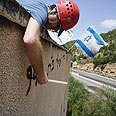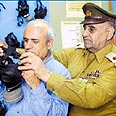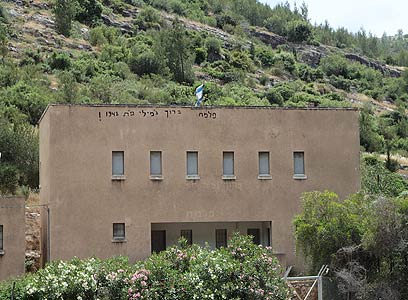

The graffiti, left on an old pumping station by an Israeli soldier during fierce battles around the road to Jerusalem, reads, "Palmach Baruch Jamili P.T. 1948!"
The Palmach was an elite Jewish strike force that fought in the two-year war that followed Israel's creation in 1948. Baruch Jamili was the soldier's name, and "P.T." stood for his hometown, Petah Tikvah, near Tel Aviv.
The exclamation mark, intentionally or not, appeared to express something of the urgency of the fighting, which saw the newly created state of Israel defeat Palestinian Arabs and the armies of surrounding Arab states at the cost of 6,000 men and women, 1% of Israel's Jewish population at the time.

'Palmach Baruch Jamili P.T. 1948!' (Photo: AP)
The original graffiti was erased by the building's owner, Israel's national water company, in 1984. The restored version was visible in fresh black paint along the main Jerusalem-Tel Aviv highway on Wednesday.
The government and the company commissioned an artist to replicate the graffiti in time for the country's Memorial Day and Independence Day, marked earlier this week.
"We are happy to restore a historical icon that made its way into Israeli culture and sums up in one short sentence an entire period and a generation to which we owe the founding of the country," said Cabinet Secretary Zvi Hauser.
Popular song
The graffiti, which served for years as a kind of unofficial landmark reminding passersby of the war, was made famous in 1974 when one of the country's best-known singers, Shlomo Artzi, wrote a hit song about it. It reflected the somber mood in the country after the devastating war of 1973 and its heavy casualties, contrasting the more upbeat atmosphere that preceded that conflict.
"Of the sadness of Bab el-Wad," the song goes, using the Arabic name for the spot, "only one name is left: Baruch Jamili and the Palmach."
The questions posed by the song – "Who was Baruch Jamili? What did Baruch Jamili do? Where is Baruch Jamili?" – were answered after it became popular: Jamili was an Israeli of Yemenite extraction who was 25 at the time of the 1948 war.
He was assigned to escort armored trucks trying to fight their way up to the besieged Jewish sector of Jerusalem, the burned-out shells of which have been preserved as memorials by the side of the road.
He unsuccessfully tried to fight the erasure of the graffiti that made him famous, and which he saw as a reminder of the battles that killed many of his comrades.
Jamili died in 2004 at age 81.
- Follow Ynetnews on Facebook















